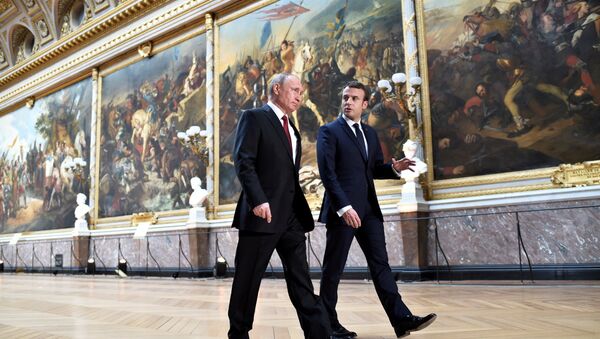French President Emmanuel Macron has invited Vladimir Putin to his summer residence, the Fort de Bregançon on the French Riviera, just a few days before the G7 meeting in the French city of Biarritz.
Aside from discussions on how to improve relations between the European Union and Russia, here are some other key topics that the two presidents are expected to address during a rare bilateral meeting:
Ukraine
The Russian side has confirmed that Putin and Macron will focus on the Ukrainian crisis and prospects of the so-called Normandy Four format, which includes Russia, France, Germany, and Ukraine.
The two heads of state previously agreed on the need to revive talks on settling the Ukrainian conflict as they met one the sidelines of the G20 summit in Osaka, Japan, in June.
According to France 24, citing an unnamed French official, the election of new Ukrainian President Volodymyr Zelensky could give a new impulse to putting an end to the conflict, which broke out five years ago after the self-proclaimed Donetsk and Lugansk people's republics refused to recognise the new government of Petro Poroshenko following a coup d'etat.
In 2015, the warring parties inked a ceasefire deal in Minsk following negotiations brokered by the Normandy Four. Despite the agreement, sporadic fighting has continued in the region.
Iran
Iran will also be high on the agenda, as tensions are running high in the Middle East, with the United States and the UK putting together a maritime coalition against an alleged Iranian threat.
Both Russia and France are committed to the preservation of the Joint Comprehensive Plan of Action (JCPOA), also known as the 2015 Iran nuclear deal, despite the unilateral withdrawal of the US from the accord in May 2018.
Washington has imposed several rounds of sanctions against the Islamic Republic and threatened to introduce secondary penalties against those doing business with Tehran, including European companies - something which prompted such oil and gas giants as France's Total to leave the Iranian market.
Kremlin advisor Yuri Ushakov has confirmed that the two heads of state will discuss Iran's nuclear programme as well. On the one-year anniversary of the US pullout, Tehran announced that it would scale back on some of its voluntary commitments under the deal, having laid out a 60-day deadline for the five remaining signatories to the accord - France, Russia, Germany, the UK, China - to ensure that its interests are protected or else it would resume enriching uranium at a higher level.
After the deadline expired, Tehran stated that it would deliver on its promise and begin enriching uranium beyond the 3.67 level set by the deal, while at the same time it would steadily abandon its nuclear obligations every 60 days.
Syria
Putin and Macron are also poised to discuss the eight-year crisis in Syria - days after a long-awaited ceasefire entered into force in the last militant stronghold, Idlib, and was breached by terrorists shortly thereafter. The Syrian Armed Forces have subsequently renewed activities in the northwestern province following militant non-compliance with a Sochi agreement brokered by Russia and Turkey.
Earlier this year, the French government reaffirmed that France would maintain a military presence in the Middle East throughout 2019 to "eradicate" terrorists regardless of US President Donald Trump's decision to pull all US troops out of Syria after proclaiming an alleged victory over Daesh*.
*Daesh, also known as ISIS/IS/Islamic State, is a terrorist group banned in Russia and many other countries.




